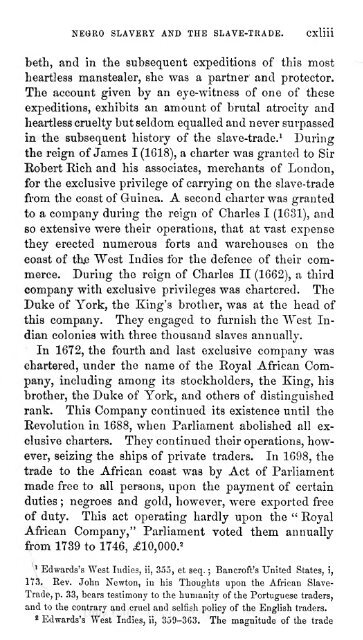Untitled - African American History
Untitled - African American History
Untitled - African American History
You also want an ePaper? Increase the reach of your titles
YUMPU automatically turns print PDFs into web optimized ePapers that Google loves.
NEGRO SLAVERY AND THE SLAVE-TRADE. Cxlili<br />
beth, and in the subsequent expeditions of this most<br />
heartless manstealer, she was a partner and protector.<br />
The account given by an eye-witness of one of these<br />
expeditions, exhibits an amount of brutal atrocity and<br />
heartless cruelty but seldom equalled and never surpassed<br />
in the subsequent history of the slave-trade. 1<br />
During<br />
the reign of James I (1618), a charter was granted to Sir<br />
Robert Rich and his associates, merchants of London,<br />
for the exclusive privilege of carrying on the slave-trade<br />
from the coast of Guinea. A second charter was granted<br />
to a company during the reign of Charles I (1631), and<br />
so extensive were their operations, that at vast expense<br />
they erected numerous forts and warehouses on the<br />
coast of thje West Indies for the defence of their com-<br />
merce. During the reign of Charles II (1662), a third<br />
company with exclusive privileges was chartered. The<br />
Duke of York, the King's brother, was at the head of<br />
this company. They engaged to furnish the West In-<br />
dian colonies with three thousand slaves annually.<br />
In 1672, the fourth and last exclusive company was<br />
chartered, under the name of the Royal <strong>African</strong> Com-<br />
pany, including among its stockholders, the King, his<br />
brother, the Duke of York, and others of distinguished<br />
rank. This Company continued its existence until the<br />
Revolution in 1688, when Parliament abolished all exclusive<br />
charters. They continued their operations, how-<br />
ever, seizing the ships of private traders. In 1698, the<br />
trade to the <strong>African</strong> coast was by Act of Parliament<br />
made free to all persons, upon the payment of certain<br />
duties ; negroes and gold, however, were exported free<br />
of duty. This act operating hardly upon the " Royal<br />
<strong>African</strong> Company," Parliament voted them annually<br />
from 1739 to 1746,


